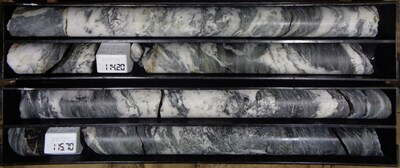VANCOUVER, BC, June 28, 2023 /CNW/ - MANTARO PRECIOUS METALS CORP. (TSXV: MNTR) (OTCQB: MSLVF) (FSE: 9TZ) (the "Company" or "Mantaro") is pleased to report results from a petrographic study on drill core from the Company's maiden drill program at the Gold Hill gold deposit in Bolivia. This report represents a final stage of verification prior to release of a maiden mineral resource estimate.
- Gold deposition at La Escarcha, including gold grades intercepted in the maiden drill program, is primary and not related to supergene effects. This has positive implications for gold grades at depth.
- Gold occurs as free-milling native gold present primarily at quarts-carbonate crystal boundaries and along fractures within quartz and pyrite.
- Gold grain size and shape, and likelihood that a significant percentage of native gold will liberate freely during comminution, is consistent with the results of bench-scale metallurgical tests which reported excellent gold recovery by gravity and cyanidation.
- Sulphide content is generally low, which in conjunction with abundant acid-neutralizing carbonate gangue minerals, have positive implications for tailings
Dr Chris Wilson, FAusIMM (CP), FSEG, FGS, principal consultant to Mantaro comments, "The findings of the petrological study and bench-scale metallurgical testing by SGS, have further de-risked the project. Given that Golden Hill is a permitted mining concession, the petrographic data will assist in review of near-term mining scenarios, and design of a high reward Phase 2 drill program to target along strike and deeper extensions of La Escarcha mineralized system."
A petrographic study was conducted on 32 drill core samples from the Company's maiden drill program at La Escarcha and Gabby. Samples were collected at vertical depths of 20 to 120 meters below surface and are representative of the style and grade of mineralization intercepted.
The primary objective of the petrographic study was to: (1) better understand the mineralogical signature of the auriferous quartz-carbonate shear zones, (2) quantify gold grain size, distribution and morphology, (3) characterize gold-gangue (waste) mineral relationships for input into metallurgical studies, and (4) provide input for future exploration targeting. A combination of thin section, polished block microscopy and scanning electron microscope ("SEM") backscattered electron mapping was used.
Petrographic work was complemented by extensive core-logging, thereby, placing the study's findings into the broader 3D framework of the deposit and the structural and hydrothermal evolution of the mineralized system. The work was completed by Specialist Exploration Services LLC and overseen by Dr Chris Wilson, principal geological consultant to the Company, who has over 35 years of petrographic and analytical experience of mineral deposits and associated hydrothermal systems.
Supergene (or surface weathering) processes are characterized by the breakdown of primary sulphide minerals through contact with acidic rain and near-surface groundwater. Chemical reactions liberate gold from sulphides as they are converted to iron oxides such as limonite, hematite and goethite. Supergene process may result in an enriched near-surface zone with elevated gold grades. Understanding if supergene enrichment has affected near-surface gold grades is critical to drill targeting the deeper potential of the mineralized system.
Petrographic examination of drill core from La Escarcha confirmed the presence of free gold with pyrite and arsenopyrite. Mineralization is of primary (or hypogene) character and there is no evidence of oxidation or supergene processes. This is highly significant as it indicates that gold grades reported from the Company's near-surface maiden drill program are not enhanced by surficial processes, but are primary hypogene grades formed during deposition of gold and sulphides from mineralizing fluids.
It is worth noting that primary sulphide mineralization in orogenic or greenstone-hosted gold systems worldwide extends over vertical intervals of greater than 1 km — as evidenced by drilling and/or mining of many peer group deposits. Drilling by the Company at La Escarcha has focused on a "small panel" of generally less than 90 vertical meters over a limited strike length of only 400 m. The absence of supergene enrichment confirms the depth potential of the system and has allowed the Company to confidently plan further high-reward step-back and step-holes at La Escarcha.
Dr Chris Wilson further comments, "enrichment of near-surface gold grades through supergene process is a potential concern when using near surface drill results to target deeper extensions of the mineralized system. The absence of supergene process in near-surface drill core intercepts at Golden Hill indicates that assay results reflect primary or hypogene grades — confirming the robust depth potential of the system. As a fully permitted mining concession, Mantaro is able to re-commence drilling at any time, without the need for further permits."
Bench-scale metallurgical testing on an underground bulk sample conducted by SGS and previously reported by Mantaro demonstrated excellent recovery of gold by gravity (74%) and cyanide (94%). Metallurgy was conducted on a 170 kg sub-sample of a 10 tonne underground sample with head grade of 5.53 g/t Au, which is consistent with grades noted in the maiden drill program.
Petrographic study confirms that gold presents as flecks and grains of generally between 25 to 100 microns diameter with coarse outliers of up to 2 mm diameter. Gold occurs at quartz-carbonate-feldspar crystal boundaries and along fractures in quartz and sulphides (mainly pyrite). As such, gold should freely liberate during commination by simple crushing and milling. This is consistent with (1) the metallurgical recoveries reported by SGS, and (2) historical mine production records which demonstrated robust gravity recovery.
Dominant gangue (or waste) minerals include quartz-carbonate-feldspar-mica and between 2 to 12% sulphides — comprising primarily pyrite and arsenopyrite, lesser pyrrhotite and traces of chalcopyrite. Total sulphide content is typical of hypogene mineralization in greenstone-hosted orogenic gold deposits worldwide. Sulphide content is variable with pyrite and arsenopyrite predominantly forming in more micaceous fabrics — this should not impact the liberation of gold during milling.
Gold grain size and morphology, and the extent to which gold liberates freely from gangue minerals, are fundamental parameters affecting gold recovery by gravity. Specifically:
- Grain Size: Gold grain size exerts a fundamental control on the efficiency of gravity recovery. Gold particles greater than 20 to 30 microns diameter are generally well recovered by gravity.
- Grain Morphology: Equant gold grains are more amenable to gravity recovery than flakey and foil shaped gold grains.
- Liberation: Native gold can be recovered using gravity techniques given it has an SG of 19.3 as compared to gangue (waste) minerals which generally have an SG of 2.5 to 4.0. For this reason, it is important that gold grains liberate freely from the waste minerals. Gold grains which remain encapsulated within, or attached to gangue minerals, form composite particles with an average specific gravity significantly less than that of pure gold. Such composite particles may not present to gravity recovery.
Petrographic examination has demonstrated that most gold particles within maiden intercepts at Golden Hill are coarser than 30 microns, are generally equant to oval in shape, and the dominant position on crystal boundaries and fractures suggest robust and complete liberation. A number of very fine gold grains are noted within pyrite and arsenopyrite, but collectively this component is a minor fraction of the total gold endowment.
Petrographic study, in conjunction with detailed core logging, confirms that gold mineralization at Golden Hill is hosted in quartz-carbonate shear zones with generally low to locally moderate sulphide component. The dominant sulphides are pyrite and arsenopyrite — both preferentially developed in metasediment wall rocks.
Major gangue minerals consist of quartz-carbonate-feldspar and micaceous metasediments. Carbonate minerals are acid neutralizing — which in conjunction with the generally low sulphide content — suggests that tailings will not generate significant acid. This is consistent with observations of the historical tailings.
Mantaro continues petrographic study for input into further bench-scale metallurgical tests designed to improve and optimize first-pass tests which reported 74% gravity gold recovery. Specifically, further petrology and bench-scale metallurgical testing will focus on fine-tuning the comminution and gravity flow path to ensure that smaller gold particles (<20 microns) which are encapsulated within pyrite are freely liberated. Whilst this fine gold component represents a relatively small percentage of the total gold endowment, Mantaro is confident that gravity recovery can be further optimized.
Dr Chris Wilson, further comments, "in addition to establishing that gold grade intercepts from the maiden drill program are primary or hypogene in nature and not associated with supergene enrichment, petrology has also confirmed that native gold is free-milling and not refractory. Gold grain size and morphology, and common occurrence of native gold at crystal boundaries and along fractures in gangue minerals, is consistent with recovery of gold via gravity and/or cyanidation flow-paths. Low to locally moderate sulphide content, and abundance of acid neutralizing carbonate minerals, is a significant positive with respect to tailings characteristics."
Dr. Christopher Wilson, Ph. D., FAusIMM (CP), FSEG, a Qualified Person under National Instrument 43-101, has reviewed and approved the technical information contained in this news release.
Mantaro Precious Metals Corp. is a British Columbia company that holds a diversified portfolio of gold and silver focused mineral properties in Bolivia and Peru. The Company holds an option to acquire up to an 80% interest in the advanced Golden Hill orogenic gold property ("Golden Hill"), located in the underexplored Precambrian Shield, Bolivia.
In Peru, the Company has a 100% interest in the high-grade Santas Gloria silver property as well as a 100% interest in each of the La Purisima, Cerro Luque and Huaranay properties.
Information set forth in this news release contains forward-looking statements that are based on assumptions as of the date of this news release. These statements reflect management's current estimates, beliefs, intentions and expectations. They are not guarantees of future performance. The Company cautions that all forward looking statements are inherently uncertain and that actual performance may be affected by a number of material factors, many of which are beyond the Company's control. Such factors include, among other things: risks and uncertainties relating to Company's limited operating history, ability to obtain sufficient financing to carry out its exploration programs and the need to comply with environmental and governmental regulations. Accordingly, actual and future events, conditions and results may differ materially from the estimates, beliefs, intentions and expectations expressed or implied in the forward-looking information. Except as required under applicable securities legislation, the Company undertakes no obligation to publicly update or revise forward-looking information.
The forward-looking statements contained in this news release are made as of the date of this news release. Except as required by law, the Company disclaims any intention and assumes no obligation to update or revise any forward-looking statements, whether as a result of new information, future events or otherwise.
Neither the TSX Venture Exchange nor its Regulation Service Provider (as that term is defined in the policies of the TSX Venture Exchange) accepts responsibility for the adequacy or accuracy of this release.
SOURCE Mantaro Precious Metals Corp.








